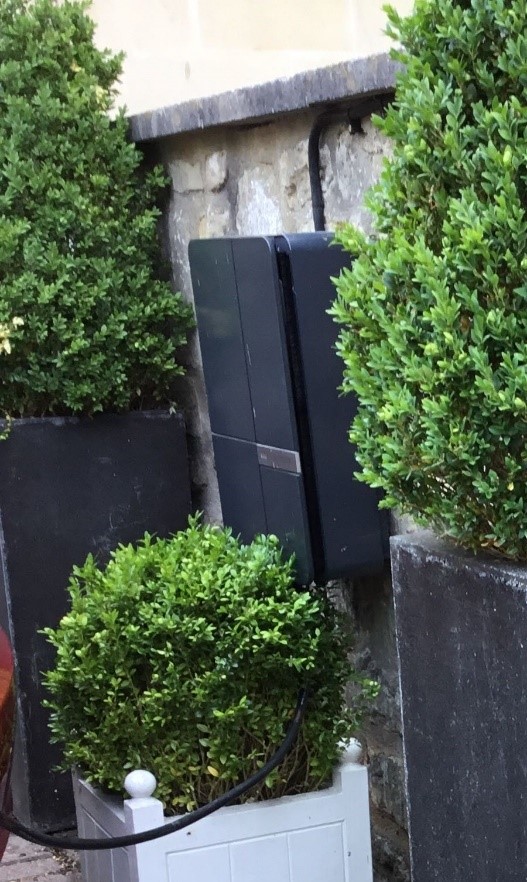A discreetly located electric vehicle charging point within a residential curtilage in Bath.
An electric vehicle is powered by an electric motor using rechargeable batteries. Electric vehicles offer an excellent opportunity to address the Climate Emergency because they have significantly lower carbon emissions compared to traditional fuel-powered vehicles. They also help to reduce vehicle running costs, meaning you could make a return on the initial upfront cost of your investment.
Electric vehicles function by plugging into a charge point and taking electricity from the grid. Therefore, a high-quality network of charge points where people regularly park is essential to unlocking electric vehicle uptake. Knowing that charge points are available, both at homes and within a range of public places, gives residents and visitors the confidence to purchase or lease an electric vehicle, supporting Bath and North East Somerset’s air quality initiative and goal of achieving net zero carbon by 2030.
Ideally, charging infrastructure for electric vehicles should be integrated within new developments from the design and construction stage; this ensures that charge points are conveniently placed, and it is usually less expensive than installing charge points at a later date. However, it is also possible to retrofit EVCI by integrating it into existing developments.
Unlike a conventional plug socket, a charge point communicates directly with your car, making charging at home much safer.
Ease of access and convenience makes electric vehicles a more practical option.
Charging time is reduced by between 30% and 60% depending on the car, making charging at home much quicker.
Installing Electric Charging Vehicle Infrastructure can be expensive, but there are schemes available that can help reduce the costs.
The cost-saving schemes mentioned below may be subject to change in terms of both eligibility and availability over time. We also encourage you to look online for the latest advice on current EVCI funding initiatives.
Electric Vehicle Homecharge Scheme (EVHS): The UK government encourages the use of electric vehicles by providing funding towards the cost of installing an electric charging point at a residential property.
Workplace Charging Scheme:: The Workplace Charging Scheme (WCS) is a voucher-based scheme that provides support towards the up-front costs of the purchase and installation of electric vehicle charge-points, for eligible businesses, charities and public sector organisations.
Read full details of all the grants available from government can be found on the GOV.UK website.
To get the best deal for home charging, it's important to get the right electric vehicle electricity tariff. Many providers now provide competitive deals for electric vehicle charging. We recommend comparing quotes.
The Town and Country Planning (General Permitted Development) (Amendment) (England) Order 2011 introduced permitted development rights for EV charge points in off-street public and private car parking areas (Part 2 Class D & E). Specifically, charge points can be installed, altered or replaced in areas of off-street parking if:
- they are not within 2 metres of the highway
- ‘upstands’ (i.e. bollards) do not exceed 2.3 metres in height,9 or 0.2 cubic metres if wall-mounted
- they are not within a site designated as a scheduled monument, or within the curtilage of a listed building
- there is not more than one upstand for each parking space
In situations not covered by these permitted development rights, planning permission is required in order to install charge points. Generally, EV charge points are more likely to be accepted if they:
- are well-designed charge point units (i.e. sensitive to context, with minimal street clutter and impact on street scene)
- are placed so they do not create excessively-narrow pavements
- have minimal lighting and signage around the unit
Listed building consent is required for EVCI.
Choose a discreet location for any associated equipment.
Be mindful of the setting of heritage assets and the requirement to preserve or enhance the character and appearance of the conservation area.
Avoid physically altering a heritage asset where possible and, where this is unavoidable, minimise the damage and loss of historic fabric.
Consult our Conservation and Planning Team at the earliest opportunity to seek specialist advice.
We support carefully designed and sited electric vehicle charging points.
In the light of the Climate Emergency, we will generally permit and encourage these on and nearby listed and other buildings, with special regard to the the following:
- Preserving the building, its setting or any features of special architectural or historic interest which it possesses
- Preserving or enhancing the character of a conservation area
- Respecting the significance of any non-designated heritage asset
To check grid capacity before installing EVCI, use this map provided by Western Power Distribution. Alternatively, contact WPD directly on: 0800 096 30 80.
Read Bath and North East Somerset’s emerging Electric Vehicle Charging Strategy
The Revive charging network is one of the main charging networks in the West of England (which includes charge points in Bristol, South Gloucestershire, Bath and North East Somerset, and North Somerset), and was set up by the four local authorities.
The Energy Saving Trust provides practical guidance on electric vehicles and EVCI, including:

